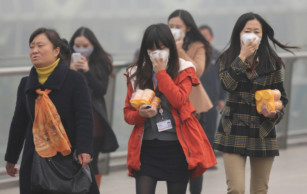
A new report by the World Health Organisation, describing how a quarter of all global deaths of children under five are due to polluted environments, has triggered a fresh round of debate.
Focusing mainly on the domestic implications of pollution, the Washington Post said in an editorial: “Despite calling for clean air and clean water in his first speech to a joint session of Congress, President [Donald] Trump is reportedly aiming to cut the Environmental Protection Agency’s staff by a fifth... In reality, focusing only on the pollution challenges of the past, not those of the present or the future, ignores vast volumes of evidence on the ecological and human damage various types of pollution still cause. Imagine what the country would be like now if politicians had folded years ago to industry complaints about environmental protections now considered rudimentary. Actually, you may not have to imagine. A group of American and Canadian researchers recently released a global air pollution death toll, finding that two major types of air pollution were associated with 4.2 million deaths in 2015, which was a staggering 7.6 per cent of all deaths.”
Observing that air pollution around the world is taking a staggering toll, the paper noted: “Beyond appreciation for effective environmental enforcement, there are at least two lessons. First, major developing nations such as China and India must find a way to grow their economies without substantially degrading their air quality. Second, if world governments continue to press major developing nations on cross-border pollution matters, they will be aided by popular internal demand for cleaner air.”
The Guardian, meanwhile, commented on the lack of political will to resolve a looming disaster. “A problem that cannot be seen is one that politicians will generally choose to ignore. That natural human tendency is dangerously short-sighted. When it comes to air pollution it is literally lethal. Scientists and environmental campaigners have been warning about a build-up of toxins in the atmosphere over British cities for years. Yet only when the filth forms a visible haze, when people are advised to stay indoors because outdoor respiration is palpably harming their health, does the issue register on many political radars,” the paper said in an editorial.
“The smogs of the early 1950s were unignorable, not just because they could be seen but because they were obvious killers. Hundreds of thousands are directly affected by equivalent scourges today — particulate emissions, nitrous and sulphurous compounds, mostly belched from cars. Children and the elderly are most at risk; minority ethnic and deprived communities are harder hit; but no one is immune,” the paper said.
In India, the Hindu focused on environmental issues affecting the world’s largest democracy. “It is an irony that the national capital and several other cities suffer crippling pollution in the post-monsoon and winter months partly due to biomass burning, when demand for fodder is rising and the surplus material could be used productively... Given the twin benefits of pollution abatement and better productivity, conservation agriculture needs to be popularised. Burning residues add greenhouse gases that cause global warming, besides pollutants such as carbon monoxide, ammonia, nitrous oxide and sulphur dioxide that severely affect human health. Sustained work is called for... By one estimate, if India can reach its own air quality standards for fine particulate matter from all sources, annual premature deaths can be cut by almost 10 per cent,” the paper said in an editorial.
The Philippines Star, meanwhile, sought to provide a larger perspective for developing nations. “Several advanced economies that now rank high in terms of air quality also used to be heavily polluted due to industrialisation, proving that cleaning up the air is possible. Many of them have expressed willingness to share their experience with cities in developing nations in curbing air pollution. Apart from learning from others, countries such as the Philippines can tap development aid for the substantial initial investment needed for green fuel and technology. Multilateral lenders have expressed readiness to provide financing for improving air quality in mega-cities. There’s a lot of help available in cleaning up the air we breathe. What is needed is political will and efficient implementation,” the paper said in an editorial.








